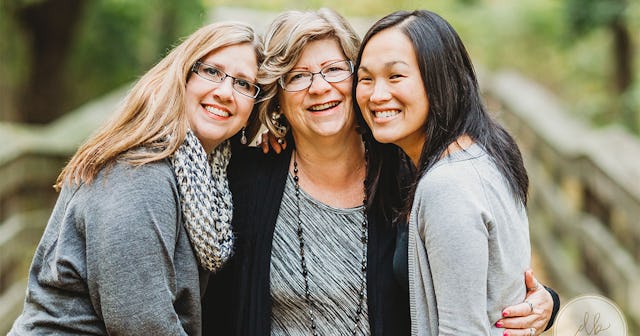I Was Adopted, And I Constantly Had To Explain My Family

Prior to introducing my family to others, a formal introduction, sharing of photos, etc., I say something like, “I don’t look like my family. My family is white. I was adopted.”
This statement is not meant for shock value, or pity, but just me calling it like it is. My earliest memory of doing this is in middle school, when I was attempting to convince a friend that the Caucasian substitute cafeteria monitor was indeed my grandmother. “I swear. She’s my grandma. I don’t look like my family. My family is white. I was adopted. Grandma, come over here for a second and meet my friend.”
As I got older, I started to take a mental note of people’s reactions. It’s like you can see the person’s inner thought process happen in a split second: “I’m confused. They look nothing alike. Oh, she’s adopted.”
I am indeed adopted, and my family indeed looks different than I do. I was one of the thousands of babies that were adopted during the 1980s and ’90s from South Korea. As my personal story goes, I was the eldest of the babies on the airplane who were being adopted at the ripe old age of four months old. My parents waited for me to come off the airplane, and when I did, pictures would indicate I was very confused. But the rest, after that, is history.
I was raised in a loving, working class family with parents and a sister (they’re white, I was adopted) in a suburb in Upstate New York. I now have a family of my own with two small biological children of my own. Being able to watch your genetics in action when you have never been able to before has been amazing to witness, but that story is for another time.
Courtesy of Trisha Kilbourn
As an adoptee, I thought I’d give some friendly tips on how to be thoughtfully curious about an adopted person without unknowingly offending or hurting feelings. So, here we go…
“Where are you from?”
This is an interesting and slightly confusing question for me when asked. I can never tell if someone is asking me where I currently live, where I grew up, or where I was born. So usually, I end up giving either an explanation of all, or ask for clarification. If you’re curious, feel free to ask — but it might be more helpful to clarify with a more specific question.
“So where is your real mom?” or “So that’s not your real family?”
Families — biological, step, mixed, and every other combo of family in between — call each member of their family what they feel comfortable calling them. In my family, my mom and dad were referred to as Mom and Dad. Another person might call their parental figures Sam and Judy. Who am I to dictate what title or name people use for one another? But please, please, don’t use the word “real” in the same sentence as family. My parents, while not biologically related to me, are indeed very real.
Courtesy of Trisha Kilbourn
“So why were you given up?”
Not all adopted children were given “their story” of where they came from. I myself have little information, other than I was left at a hospital in Korea and given up for adoption with my biological mother’s wish of being raised by a good family. And regardless of how much information is known (or unknown) about the adoption circumstances, the adoptee may not want to speak about it. It’s a very personal question that is better left for the adoptee to bring up and talk about … when and if they want to.
“Do you want to find __(insert person)___?”
This is a reasonable question that I guarantee the adopted person has asked themselves multiple times throughout their life. While the question may sound like it should have an easy “yes or no” response after it, it does not. So, I’ll answer the question for you. Yes, the adopted person has thought about wanting to reunite with this person. But the adoptee will let you know if they want to dive deeper into this question, so there’s no need to ask.
Courtesy of Trisha Kilbourn
“Have you tried those genetic test kits? I hear you can find out a lot!”
I’m not a scientist, but I do remember watching a special as a teenager on the Human Genome Project and how it takes years and years to map out a person’s genes. Now, you spit in a vial and within weeks you have results. Science is truly an amazing thing. I don’t personally have any feelings for or against this question. I do, however, suggest that unless the adoptee is specifically discussing finding biological relatives, don’t recommend using the kit to find biological relatives. Adoptees all know that is a byproduct of taking a genetic test.
In my house, we (the littlest members, anyway) are fans of “Elmo’s World.” Recently, we watched an episode about families. I was happy to see that there were different types of families represented in the episode. But more importantly, the focus was on what qualities make up a family, not just what family looks like.
This article was originally published on